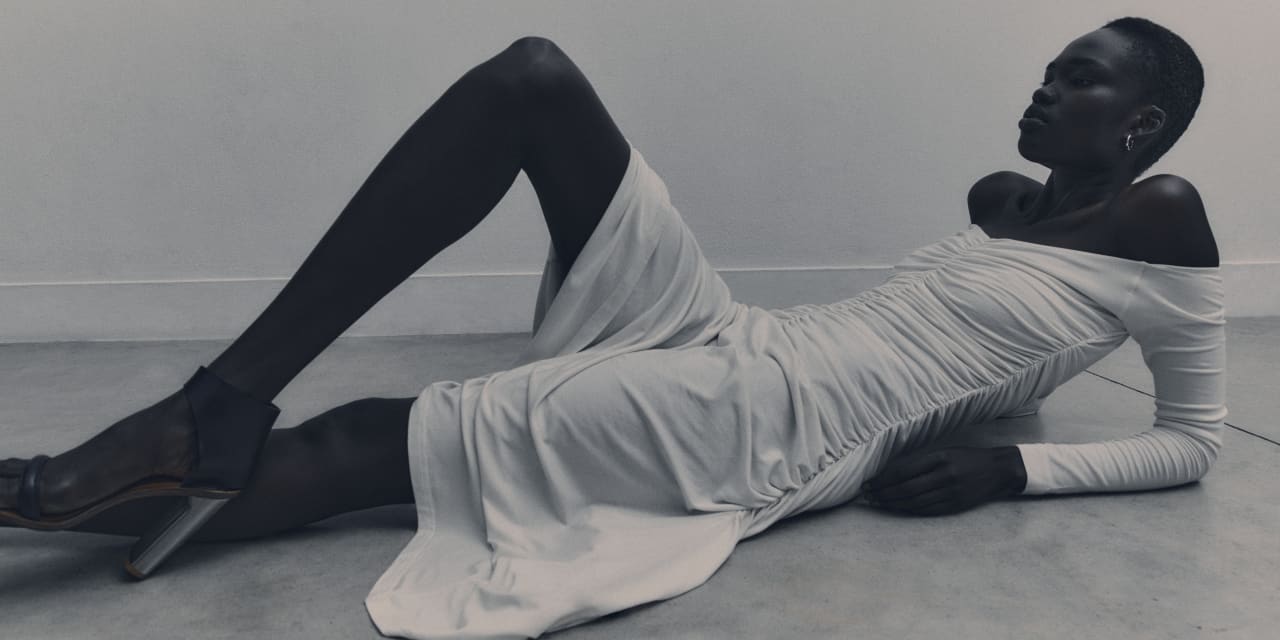Ninety Percent co-founder Shafiq Hassan was working for BRAC, a Bangladesh-based non-governmental organization, when he felt a calling to create more jobs for women in Bangladesh.
Hassan pivoted into the world of garment manufacturing, and co-founded garment supply Echo Sourcing in 1996 with Para Hamilton, a friend who he met at a previous job in fashion in 1987.
Fast forward to 2018, when Hassan and Hamilton launched their London-based clothing line Ninety Percent with the lofty ambition of sharing 90% of their profits with causes they support and with the people who make the brand’s clothing. At Ninety Percent, shareholders take 10% profits and the company donates 80% to five causes it supports and 10% to the people who make the clothes, on top of their wages.
More: Fashion Designer Christian Siriano’s Favorite Things
Ninety Percent’s elevated basics—simple separates, like slouchy T-shirts or longline, fluid dresses—are made from low-impact, vegan, and certified-organic materials. The minimalist designs are sold at luxury retailers like Net-a-Porter and Harrod’s.
“We use natural, renewable, biodegradable, and certified-organic materials when designing our collections as much as possible,” Hassan says. “We ensure every detail is of the highest quality and carries the lowest impact on the environment—our buttons are all plant-based and our metals are nickel-free.”
THE ITEM
Ninety Percent is known for luxurious takes on everyday essentials. London-based designer Elliot Atkinson joined the company last year, introducing sculptural, ethereal silhouettes to the collection.
Hassan said a few of his favorite items include the Gabo T-shirt and Anis top in organic cotton, the Apollo trouser, with its relaxed, breezy fit and double pleat, the Ios slip dress and the cold shoulder Osha dress. While most of Ninety Percent’s clothes come in neutrals, the brand has a “soft neon” collection of pastel tones and some nature-inspired prints.
THE PRICE
Basics, like organic cotton T-shirts and tanks, run US$40 to US$65, while organic track pants. Sophisticated work-appropriate separates include the oversized Signature shirt, which is US$350 and the cream Narin dress, which is US$270. For more formal occasions, the Osha dress costs US$294.
WHAT’S THE GOOD?
Hassan and Hamilton own Echotex, a factory in Dhaka that manufactures clothes for Ninety Percent among other brands. Echotex, the first factory in Bangladesh to offer health insurance to all workers and their families, fair wages and free breakfast, lunch and dinner every day, is a Bluesign Approved System Partner in sustainable textiles, platinum LEED-certified and platinum on the Higg Index for sustainable apparel.
“For us, [sustainability] incorporates respectful working environments, garment longevity, transparency and traceability, animal welfare, and water stewardship,” Hassan says.
More: Braving the Italian Alps in a Maserati
And then there is the “Ninety Percent” part: The company donates to five charities, including two children-focused charities, two environmental ones and one that empowers people living in poverty. Children’s Hope works with children in the slums of Dhaka, War Child is an international charity working to protect and support children in conflict zones, Big Life foundation focuses on wildlife conservation, WildAid aims to stop animal trafficking and BRAC helps empower people living in poverty, especially women and girls.
“Our life experience has taught us to focus on two aspects, wildlife, therefore the environment, and protecting the most vulnerable that have the least support, children,” Hassan says. “We have supported these aspects for a while and wanted to continue to do so as long as we are able to.” Hassan says Ninety Percent aims to challenge traditional retail business models while supporting his and Hamilton’s dearest causes.
WHAT’S NEXT
Hassan says Ninety Percent is focused on increasing its profits to boost the company’s impact on the social and environmental causes it supports. He also says he hopes to partner with other companies with similar values.
He says, “Collaboration is key to create change and we hope our business model gets adopted by other brands in fashion and in other sectors.”
Also, with the goal of increasing transparency with customers, the company is also developing reports on its environmental and social impact.
Read the full article here




